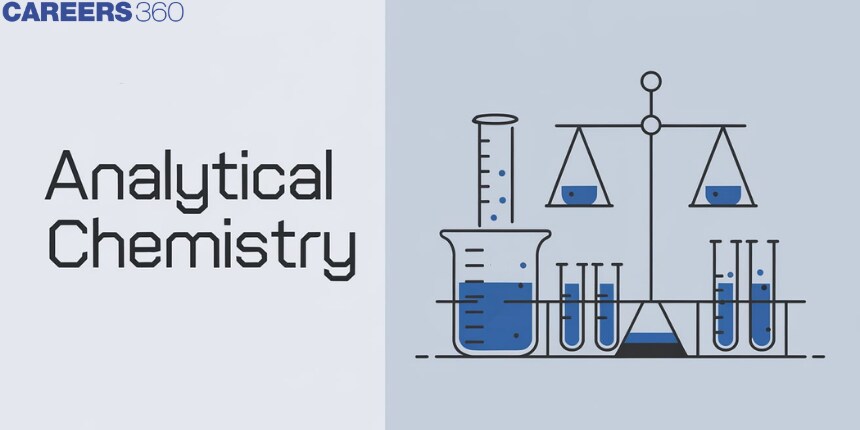Analytical Chemistry: Introduction, Methods, Branches, Importance, Applications
Analytical chemistry is the branch of chemistry that deals with the analysis of different substances.
This Story also Contains
- Introduction
- Methods Of Analytical Chemistry
- Methods Used In Analytical Chemistry
- Branches of Analytical Chemistry
- Importance of Analytical Chemistry
- Applications of Analytical Chemistry

Introduction
Analytical chemistry involves the separation,identification, and quantification of matter and it involves the use of classical methods along with modern methods which are involved in the use of scientific instruments.
Methods Of Analytical Chemistry
Analytical chemistry involves the following methods.
The methods are-
The process of separation isolates the required chemical species which can be analysed from a mixture.
The identification of the analyte substance is achieved by the method of qualitative analysis.
The concentration of the analyte in a given in mixture can be determined with the method of quantitative analysis.
Methods Used In Analytical Chemistry
The methods used to determine the identity and the quantity of the analytes in the field of analytical chemistry are broadly divided into two categories. They are classical and instrumental methods.
1. Classical Methods
There exist many classical methods of checking for the presence or absence of a particular compound in a given analyte like an acid test for gold.
One more example of a classical method for qualitative analysis is the Kastle-Meyer test which employs phenolphthalein as an indicator to check for the presence of haemoglobin in the given analyte.
Flame tests can also be used to check for the presence of specific elements in an analyte by exposing it to a flame and observing the change in the colour of the flame.
Gravimetric analysis is also considered under the classical method of quantitative analysis, which can be used in analytical chemistry and is determined by the amount of water in a hydrate by heating it and then calculating the weight of the water lost.
One of the better-known classical methods of quantitative analysis is volumetric analysis, which is also known as the titration method.
2. Instrumental Methods
In Instrumental Methods Spectroscopy involves the measurement of the interaction between electromagnetic radiation and the atoms or molecules belonging to a sample.
And with the help of electric fields and magnetic fields, the method of mass spectroscopy is used to measure the ratio of the mass of the molecule to its charge.
The common instrumental method used in the field of analytical chemistry is electrochemical analysis because in this method, the analyte is placed in an electrochemical cell and the voltage or the current flowing through it is measured.
The interaction between the analyte and energy in the form of heat is studied in the discipline of analytical chemistry which is known as calorimetry. A calorimeter is an instrument which is used to measure the heat of a chemical reaction.
It can be noted that even biological measurements are made with the help of this branch of chemistry, and this field is called bioanalytical chemistry.
Branches of Analytical Chemistry
Two sub-branches come under analytical chemistry. They are quantitative analysis and qualitative analysis.
These two methods are the backbone of many educational labs of analytical chemistry.
1. Quantitative Analysis
Quantitative Analysis is a method which helps to determine the absolute or relative quantity regarding the concentration of one or more substances present in a sample or compound.
For example, let us take a sample of an unknown solid substance. The chemists first use “qualitative” methods to identify what type of compound is present in the sample, then adopt the quantitative analysis procedure to determine the exact amount or the quantity of the compound which is present in the sample.
Some Quantitative analysis techniques are Gravimetric Analysis and Volumetric analysis.
2.Qualitative Analysis
Quality is defined as the standard or the feature of one substance. The qualitative analysis method deals with the determination of the quality of a particular compound, irrespective of its quantity or concentration.
The qualitative analysis method can be measured in different ways like Chemical tests, flame tests, etc and several tests are widely used in the salt analysis (identification of the cation & anion of inorganic salts).
Importance of Analytical Chemistry
Analytical chemistry is the branch taught in almost all schools and colleges but its applications are made in pharmaceutical industries, food factories, chemical industries, agricultural industries and scientific laboratories also. The tools which are used for this purpose are quite expensive and cannot be affordable at home.
Applications of Analytical Chemistry
Important applications of Analytical Chemistry are listed below.
The shelf lives of many medicines can be determined with the help of analytical chemistry.
Analytical Chemistry is also used to check for the presence of adulterants in drugs.
Analytical Chemistry is employed in the process of chromatography where the blood samples of a person are classified.
The concentration of pesticide residues and contaminants in a given food sample can also be determined by analytical chemistry.
Analytical Chemistry also has many important applications in medicine, with its use in the testing of cholesterol and glucose levels in a blood sample.
It is an integral part of forensic science, clinical analysis, and even environmental analysis.
Frequently Asked Questions (FAQs)
The three main objective of analytical chemistry is-
Analytical chemistry is used to develop an understanding of the range and uses of analytical methods in chemistry.
It is also used to establish an appreciation of the role of chemistry in quantitative analysis.
And it is used to develop an understanding of the broad role of the chemist in measurement and problem solving for analytical tasks.
The father of analytical chemistry is Izaak Maurits Kolthoff.
The two types of analytical chemistry are quantitative analysis and qualitative analysis.
Analytical chemistry comes underInorganic chemistry.
The two types of analytical chemistry are quantitative analysis and qualitative analysis.
Analytical chemistry is used in drug manufacturing, medical diagnostic, forensic survey, soil testing to check for appropriate concentrations of minerals and nutrients, environmental monitoring and it is also of great role in different research areas.
